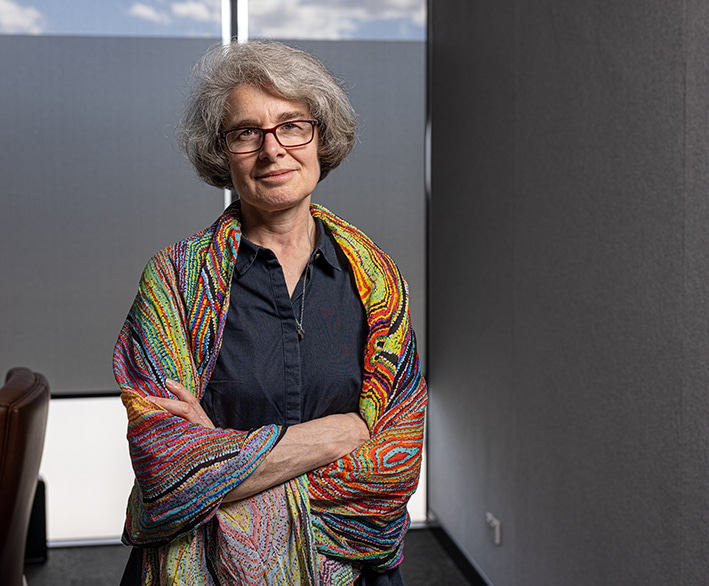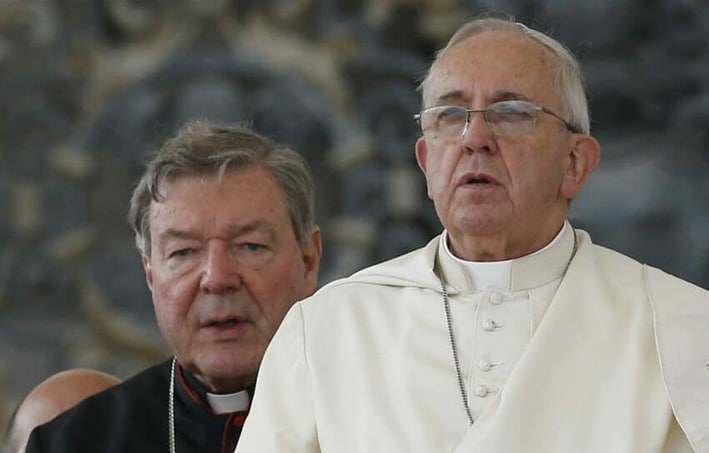
Sr Nathalie Becquart XMCJ, the undersecretary for the synod on synodality, visited Australia to promote the Church’s transformation into a ‘listening Church’.
After several years on the synodal journey, many or perhaps even most Catholics are still unclear about what synodality means.
Perhaps this is why Rome has sent the synod’s undersecretary, Sr Nathalie Becquart XMCJ, on a world tour to “sell synodality” and the Holy Father’s desire for a “listening Church”.
This formidable representative of Pope Francis’ central vision, the first woman to have a vote in the synod of bishops, stopped in Australia on the way to the Federation of Catholic Bishops Conferences of Oceania assembly held in Fiji from 6-10 February.
She held a forum and delivered a lecture at Parramatta Cathedral on Friday 3 February, following earlier talks in Melbourne.
“The Church is on pilgrimage on this earth, and the Church is walking, is journeying, toward the kingdom of God,” Sr Nathalie said.
“So as baptised, as Church, as people of God all together, in a way we are the realisation of the Church in history … not just a theoretical, abstract vision of the church as it should be, but the church in history, in a specific context.”
Sr Becquart also told Melburnians that we “must become a synod … a synodal sister, a synodal teacher, a synodal priest, a synodal bishop.”
Perhaps this clarifies the meaning of synodality for some. But it seems that the longer the synodal journey goes on, the more obscure things get for most Catholics.
The American philosopher Charles S. Peirce, a logician and scientist, spent a lot of time attempting to make obscure beliefs clear.
He had a straightforward method: to find out what something really means, see what practical effect the belief has on the lives of those who hold it.
So to discover what synodality and the shift to a “listening Church” really mean, perhaps we can simply listen to the kinds of questions asked by people who are committed to synodality.
Taking this approach, when the microphone went out to the audience at Sr Becquart’s forum, everything was made much clearer: synodality is about Cardinal George Pell.
The first questioner, a Jesuit, asked about “the role of the conservatives in the Church, and whether if the next Pope is quite conservative, he could roll back this process Francis has started”.
Taking this approach, when the microphone went out to the audience … everything was made much clearer: synodality is about Cardinal George Pell.”
“Or have we got to a tipping point where people have found their voice and they wouldn’t then give it up, even for a more conservative leadership that might come next?” he asked, to laughter and applause.
The second questioner was more explicit: “Cardinal Pell and others in America, many others as well: the impression I get is [that they think] there’s no need for synodality—’We have the truth, the truth has been handed down, and our role is to protect it.’”
“They’re not open to synodality,” he continued. “That’s my experience too. How do you bring up synodality when they think there’s no need for it, ‘We’ve got the truth.’”
The next asked whether, “in the spirit of radical inclusiveness”, there was anything Sr Becquart could say about women’s ordination and the LGBTIQ community.
A deacon from Parramatta then asked about the protesters at Cardinal Pell’s funeral.
“If we were truly synodal, why don’t we ask the question now: why are they protesting? Instead of saying ‘oh, it’s inappropriate to protest someone’s funeral.’ Or as Tony Abbott said, ‘they believe in an afterlife’—he made a joke of it,” the deacon said.
“But I think if we were truly synodal we would ask the question why. Why are they upset? Why are they protesting? How can we walk synodally with them? And some of them are Catholics, mind you.”
Number five said, to applause, that the documents and submissions from Australia’s Plenary Council did not really represent what Australian Catholics believe, and instead represented the view of the Bishops.

“How do you teach synodality, how do you trust synodality, when the clerical leadership has a vested interest in its opposite?” she asked.
Another questioner was more melancholy.
“At my church there are no young people left. There are three churches in the parish, and there are no young people there,” she said.
“Why is this? I’m aware that in the Australian culture the Catholic church is a bit on the nose because of marriage equality, LGBTIQ and also the sexual abuse particularly.
“How can we reach young people in a way that will overcome those issues? Because it’s not working in the parishes.”
There were three other questions: about making sure minority groups like consecrated virgins were heard in the church, on Sr Becquart’s career to become the Vatican’s most senior woman, and a query about synodality and technology.
But even as the mortar on the Cardinal’s tomb was still setting, the resounding theme was how synodality can prevent a future Pell. Given that the focus of synodality is the reception of Catholic teaching by the people of God, it is incumbent on everyone to take these queries from Australian Catholics seriously as a guide to the real content of a future synodal Church.
Sr Becquart answered every question with good grace—including a direct question from moderator Fr Frank Brennan SJ about the “elephant in the room”, Cardinal Pell’s description of synodality as a “toxic nightmare”.
She reminded the audience that the “people of God” included both laity and hierarchy, and that the whole Church should discern together.
But she was also reassuring and open to the general thrust of questioning.
Synodality is not merely an option among others the Church could pursue; there will be no going back under a future conservative pope, as her Jesuit confrere worried.
“Synodality is the call of God for the Church of today. It’s the way to be Church today,” Sr Becquart said.
“We can be really confident that it is the call of God, and if what we are doing is to answer the will of God, we will receive the grace to do it.”
If synodality is truly a vocation for the Church in the third millennium, then there is nothing to fear from robust encounter and dialogue between Church “conservatives” and those present at the Parramatta forum.
After all, we are all on the journey together; rather than two warring interpretations, Sr Becquart emphasised that the Church is an “oxymoron”, where two seemingly contradictory terms produce a new meaning.
We also have nothing to fear from a deep and serious interrogation of the central concepts of synodality—or from asking what effect all this will have practically on the life of our Australian Dioceses.
After all, vocations are tested as well as discerned.
Related:
Oceania the new force in Synodality
Synodality ‘neo-Marxist, New Age good will’, Pell says in parting column
